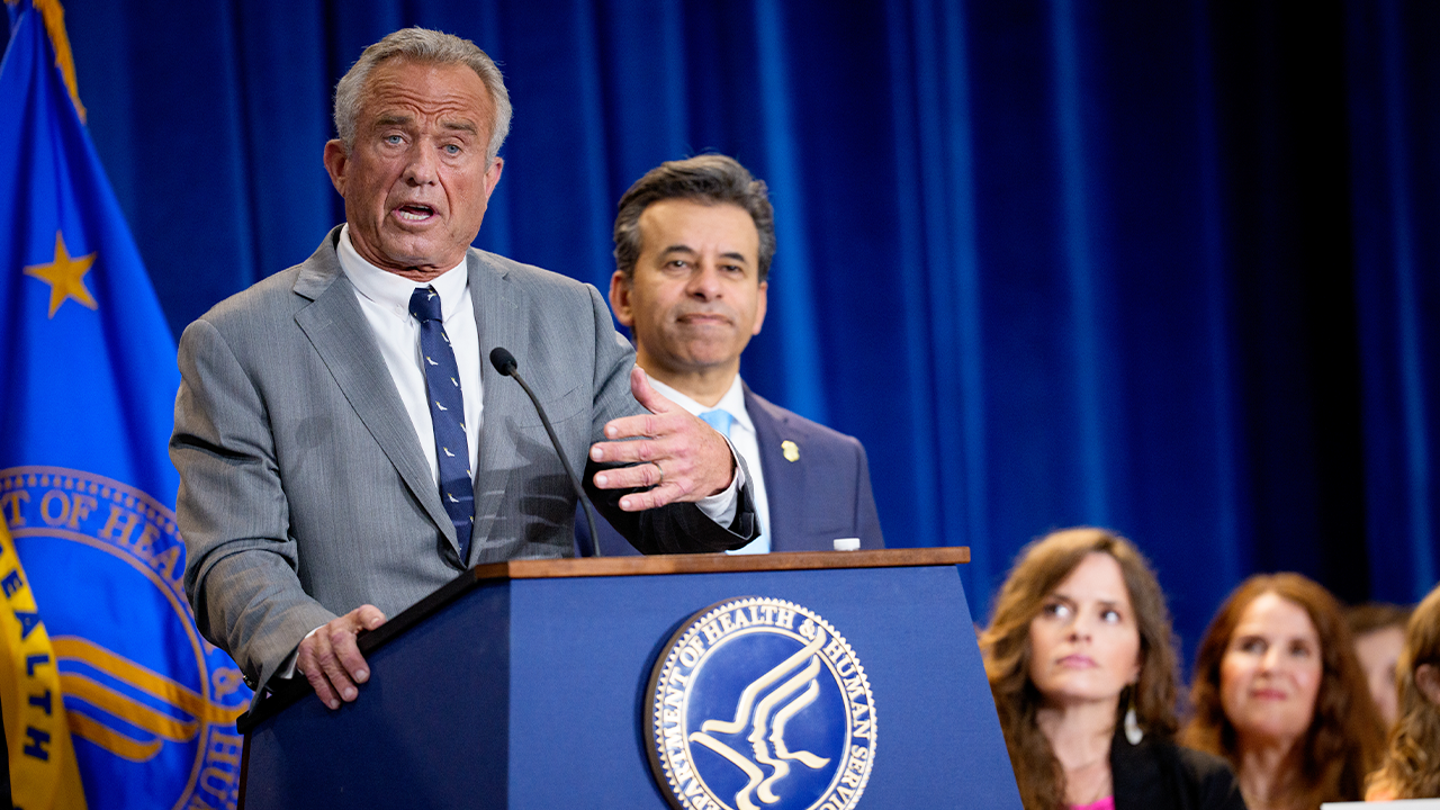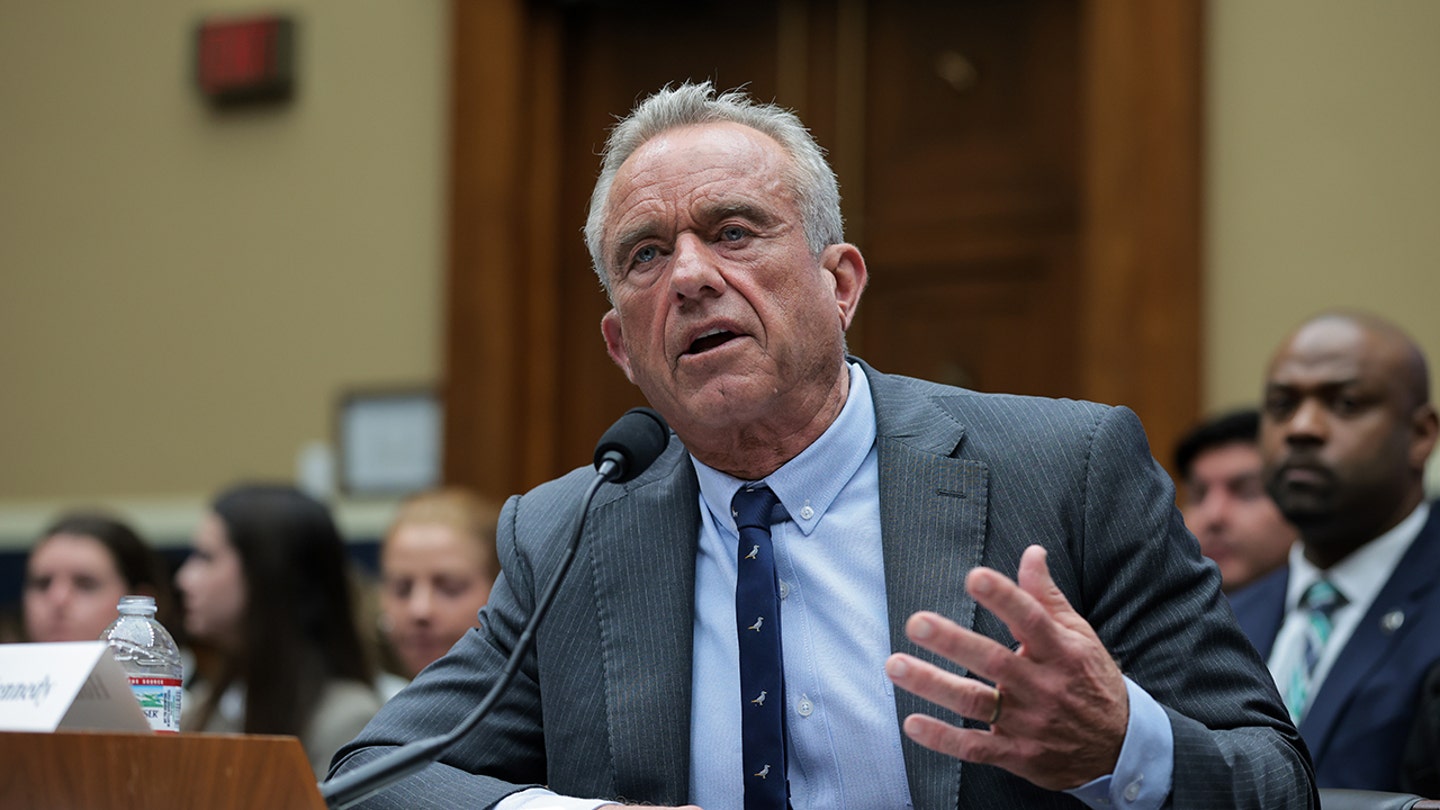
Trump-aligned legal group probes Biden-era organ transplant program over ethical concerns
Entities mentioned:
- America First Legal: Justice, Righteousness, Wariness
- Stephen Miller: Loyalty, Influence, Control
- Department of Health and Human Services: Duty, Professional pride, Security
- Centers for Medicare & Medicaid Services: Duty, Professional pride, Security
- Health Resources and Services Administration: Duty, Professional pride, Security
- Robert F. Kennedy Jr.: Righteousness, Moral outrage, Recognition
- Laura Stell: Justice, Righteousness, Professional pride
- Trump administration: Power, Control, Influence
Article Assessment:
Credibility Score: 70/100
Bias Rating: 65/100 (Lean Right)
Sentiment Score: 35/100
Authoritarianism Risk: 40/100 (Generally Democratic)
Bias Analysis:
The article leans right due to its focus on Trump-aligned groups and their concerns, as well as the 'FIRST ON FOX' label. While it presents some factual information about the organ transplant program, it gives more weight to criticisms from Trump-aligned sources.
Key metric: Healthcare System Effectiveness
As a social scientist, I analyze that this article highlights a conflict between the Biden administration's efforts to improve organ transplant access and concerns raised by Trump-aligned groups about potential ethical issues and outside influences. The investigation by America First Legal into the Increasing Organ Transplant Access Model reflects ongoing political tensions in healthcare policy. This situation could impact the Healthcare System Effectiveness metric by potentially delaying or altering the implementation of a program designed to increase organ transplant access. The controversy may lead to increased scrutiny of healthcare policies, which could either improve transparency and effectiveness or create obstacles to implementing potentially beneficial reforms. The political nature of the investigation also underscores the challenges of implementing major healthcare changes in a polarized environment.

Judge orders RFK Jr's HHS to stop sharing Medicaid data with immigration officials
Entities mentioned:
- Judge Vince Chhabria: Justice, Duty, Righteousness
- Department of Health and Human Services (HHS): Control, Duty, Obligation
- Department of Homeland Security (DHS): Security, Control, Power
- Immigration and Customs Enforcement (ICE): Control, Security, Duty
- Robert F. Kennedy Jr.: Power, Control, Ambition
- Trump Administration: Control, Power, Security
- Rob Bonta: Justice, Righteousness, Duty
- Nick Brown: Justice, Duty, Righteousness
Article Assessment:
Credibility Score: 75/100
Bias Rating: 45/100 (Center)
Sentiment Score: 35/100
Authoritarianism Risk: 25/100 (Generally Democratic)
Bias Analysis:
The article presents multiple viewpoints, including those of the judge, government officials, and immigration advocates. While it leans slightly critical of the administration's actions, it maintains a relatively balanced tone by providing factual information and quoting various sources.
Key metric: Public Trust in Government Institutions
As a social scientist, I analyze that this court order significantly impacts public trust in government institutions. The judge's decision to halt the sharing of Medicaid data with immigration officials highlights a conflict between different government agencies and their respective mandates. This situation may lead to decreased trust in health services among vulnerable populations, particularly immigrants, who may fear seeking medical care due to potential immigration consequences. The court's intervention also underscores the importance of checks and balances in the US government system, potentially reinforcing public confidence in the judiciary's role in protecting individual rights and privacy. However, the revelation of previously undisclosed data-sharing agreements between HHS and DHS may erode trust in the transparency and ethical practices of these agencies, particularly among minority and immigrant communities.

RFK Jr. Mandates All Americans Drink Mysterious Glowing Liquid
Entities mentioned:
- Robert F. Kennedy Jr.: Power, Influence, Righteousness
- Department of Health and Human Services: Control, Duty, Professional pride
- American public: Wariness, Anxiety, Self-preservation
- Medical researchers: Skepticism, Professional pride, Duty
- Government regulators: Control, Duty, Security
Article Assessment:
Credibility Score: 25/100
Bias Rating: 40/100 (Lean Left)
Sentiment Score: 30/100
Authoritarianism Risk: 75/100 (Authoritarian Tendencies)
Bias Analysis:
The article leans slightly left, mocking anti-establishment health views often associated with right-wing politics. However, its satirical nature somewhat obscures its political stance, making it less overtly partisan.
Key metric: Public Health and Safety
As a social scientist, I analyze that this satirical article highlights potential risks of unchecked authority in public health decision-making. It critiques the real Robert F. Kennedy Jr.'s controversial stance on vaccines and alternative medicines by exaggerating it to absurd levels. The fictional mandate to consume an unidentified substance plays on fears of government overreach and medical misinformation. This could impact public trust in health institutions and potentially lead to decreased adherence to legitimate public health measures.

Rabid RFK Jr. Bites Foreign Dignitary
Entities mentioned:
- Robert F. Kennedy Jr.: Righteousness, Moral outrage, Influence
- White House officials: Damage control, Professional pride, Obligation
- Tasha Sturbridge: Damage control, Professional pride, Anxiety
- Haruto Tanaka: Duty, Self-preservation, Wariness
Article Assessment:
Credibility Score: 25/100
Bias Rating: 30/100 (Lean Left)
Sentiment Score: 25/100
Authoritarianism Risk: 35/100 (Generally Democratic)
Bias Analysis:
The article leans left, evident in its satirical criticism of a conservative figure. The exaggerated portrayal of Kennedy Jr. suggests a strong disagreement with his views and appointment, indicating a left-leaning perspective.
Key metric: Diplomatic Relations
As a social scientist, I analyze that this satirical article uses absurdist humor to critique Robert F. Kennedy Jr.'s controversial views and appointment as Health Secretary. The portrayal of Kennedy as 'rabid' metaphorically represents his perceived extreme and potentially harmful ideas. The incident with the foreign dignitary symbolizes potential damage to international relations due to controversial leadership. The White House's apologetic response indicates awareness of the negative impact on diplomacy. The spreading rabies cases allude to fears about the propagation of misinformation or harmful ideologies. This piece, while fictional, reflects real concerns about political appointments and their impact on public health and international relations.
- Read more about Rabid RFK Jr. Bites Foreign Dignitary
- Log in to post comments

RFK Jr. Recommends Eating Good Cancer To Kill The Bad Cancer
Entities mentioned:
- Robert F. Kennedy Jr.: Influence, Recognition, Righteousness
- American Cancer Society: Professional pride, Influence, Self-preservation
- Pharmaceutical companies: Greed, Control, Influence
Article Assessment:
Credibility Score: 25/100
Bias Rating: 45/100 (Center)
Sentiment Score: 30/100
Authoritarianism Risk: 65/100 (Authoritarian Tendencies)
Bias Analysis:
The article presents Kennedy's claims without explicit endorsement or criticism, maintaining a neutral tone. However, the absurdity of the claims is implicitly highlighted through detailed descriptions, suggesting a subtle critique of the source.
Key metric: Public Health Outcomes
As a social scientist, I analyze that this article presents a highly controversial and scientifically unfounded health recommendation from a high-ranking government official. The dissemination of such misinformation from a trusted source could significantly impact public health outcomes by potentially discouraging individuals from seeking proven medical treatments for cancer. This could lead to increased mortality rates and a decline in overall public health. The article also highlights the growing influence of conspiracy theories and pseudoscience in public policy, which could erode trust in established medical institutions and practices.

More than 20 GOP attorneys general call on RFK Jr, FDA to reinstate safeguards for abortion drugs
Entities mentioned:
- Republican attorneys general: Righteousness, Moral outrage, Duty
- Robert F. Kennedy Jr.: Duty, Professional pride, Influence
- Martin Makary: Professional pride, Duty, Wariness
- Kris Kobach: Righteousness, Influence, Moral outrage
- Josh Hawley: Righteousness, Influence, Moral outrage
- FDA: Duty, Professional pride, Security
- Ethics and Public Policy Center: Righteousness, Influence, Moral outrage
Article Assessment:
Credibility Score: 65/100
Bias Rating: 70/100 (Lean Right)
Sentiment Score: 30/100
Authoritarianism Risk: 45/100 (Mixed/Neutral)
Bias Analysis:
The article leans right due to its focus on Republican viewpoints and reliance on conservative sources like Fox News and the EPPC. While it includes some counterpoints, the overall framing favors the GOP attorneys general's position.
Key metric: Maternal Health and Safety
As a social scientist, I analyze that this article highlights a significant political and health policy debate surrounding the abortion drug mifepristone. The Republican attorneys general are leveraging recent studies to challenge the drug's safety profile, potentially impacting maternal health outcomes. Their call for reinstating safety protocols or withdrawing the drug from the market could significantly affect access to medication abortions, which currently account for over half of all abortions in the U.S. This debate intersects with broader issues of reproductive rights, federal regulation, and the politicization of healthcare. The involvement of high-profile figures like Robert F. Kennedy Jr. and the FDA adds complexity to the issue, potentially influencing public opinion and policy decisions. The conflicting data interpretations between government agencies and conservative think tanks underscore the challenges in balancing medical evidence with political and ideological considerations in healthcare policy.

Here’s what Trump has promised to do in a second term
Entities mentioned:
- Donald Trump: Power, Control, Ambition
- Joe Biden: Legacy, Influence, Duty
- Elon Musk: Influence, Ambition, Curiosity
- Vivek Ramaswamy: Ambition, Influence, Recognition
- Robert F. Kennedy Jr.: Influence, Recognition, Righteousness
- Gary Gensler: Duty, Control, Professional pride
- Paul Atkins: Influence, Professional pride, Ambition
Article Assessment:
Credibility Score: 75/100
Bias Rating: 55/100 (Center)
Sentiment Score: 45/100
Authoritarianism Risk: 65/100 (Authoritarian Tendencies)
Bias Analysis:
The article presents a comprehensive overview of Trump's proposed policies without overtly endorsing or criticizing them. It relies on direct quotes and campaign statements, maintaining a relatively neutral tone. However, the selection of policies and their framing may slightly lean towards emphasizing controversial aspects.
Key metric: Political Polarization Index
As a social scientist, I analyze that this article outlines Donald Trump's proposed policies for a potential second term, which could significantly impact political polarization in the United States. The policies described, such as mass deportations, tariffs, and rollbacks of environmental regulations, are likely to exacerbate existing divisions between conservative and liberal factions. Trump's promises to use executive power extensively and to target political opponents through the Justice Department suggest a potential increase in authoritarian tendencies, which could further strain democratic institutions and increase polarization. The proposed economic policies, particularly on trade and taxes, may resonate with his base but could alienate moderates and the opposition, potentially widening the political divide. The article's comprehensive coverage of Trump's proposals across various sectors indicates that polarization would likely intensify across multiple fronts, including immigration, healthcare, education, and foreign policy.

Vance embraces his growing role as Trump’s chief problem solver — and the implications for a 2028 run
Entities mentioned:
- JD Vance: Ambition, Loyalty, Power
- Donald Trump: Power, Control, Legacy
- Republican Party (GOP): Power, Influence, Unity
- Marco Rubio: Ambition, Power, Recognition
- Pete Hegseth: Duty, Professional pride, Loyalty
- Robert F. Kennedy Jr.: Ambition, Legacy, Influence
- Jack Posobiec: Influence, Loyalty, Recognition
Article Assessment:
Credibility Score: 70/100
Bias Rating: 55/100 (Center)
Sentiment Score: 60/100
Authoritarianism Risk: 45/100 (Mixed/Neutral)
Bias Analysis:
The article presents a relatively balanced view of Vance's role, including both praise and potential risks. While it leans slightly towards a positive portrayal of Vance, it also includes cautionary notes about the volatility of political fortunes.
Key metric: Presidential Approval Rating
As a social scientist, I analyze that this article highlights the growing influence of JD Vance within the Trump administration and his potential as a future presidential candidate. Vance's increasing role as a problem solver and his alignment with Trump's agenda directly impact the administration's effectiveness and, consequently, the President's approval ratings. The article suggests that Vance's political future is tightly linked to Trump's success, indicating that current approval ratings may have long-term implications for both figures. The focus on Vance's ability to navigate complex issues and maintain relationships across various political spheres demonstrates how internal dynamics within an administration can significantly influence public perception and support.

Laura Loomer has the White House scrambling again — and she’s far from finished
Entities mentioned:
- Laura Loomer: Influence, Loyalty, Power
- Donald Trump: Power, Loyalty, Control
- White House: Control, Self-preservation, Influence
- Vinay Prasad: Professional pride, Self-preservation, Duty
- Susie Wiles: Control, Duty, Self-preservation
- Robert F. Kennedy Jr.: Ambition, Influence, Power
Article Assessment:
Credibility Score: 70/100
Bias Rating: 55/100 (Center)
Sentiment Score: 30/100
Bias Analysis:
The article presents multiple viewpoints and includes direct quotes from various sources, including Loomer herself. However, there's a slight lean towards portraying Loomer's actions as disruptive, which may indicate a subtle centrist or slight left-of-center perspective.
Key metric: Government Stability and Effectiveness
As a social scientist, I analyze that this article highlights a significant disruption in the normal functioning of government institutions. Laura Loomer's unofficial yet influential role in personnel decisions undermines established vetting processes and introduces instability into key government positions. This can lead to decreased effectiveness of government agencies, potential policy inconsistencies, and a climate of fear among officials. The frequent turnover and loyalty-based appointments, rather than merit-based selections, may result in less qualified individuals in crucial roles, potentially impacting the quality of governance and policy implementation. Furthermore, the external influence on internal government affairs raises questions about the autonomy and integrity of administrative processes, which could erode public trust in government institutions.